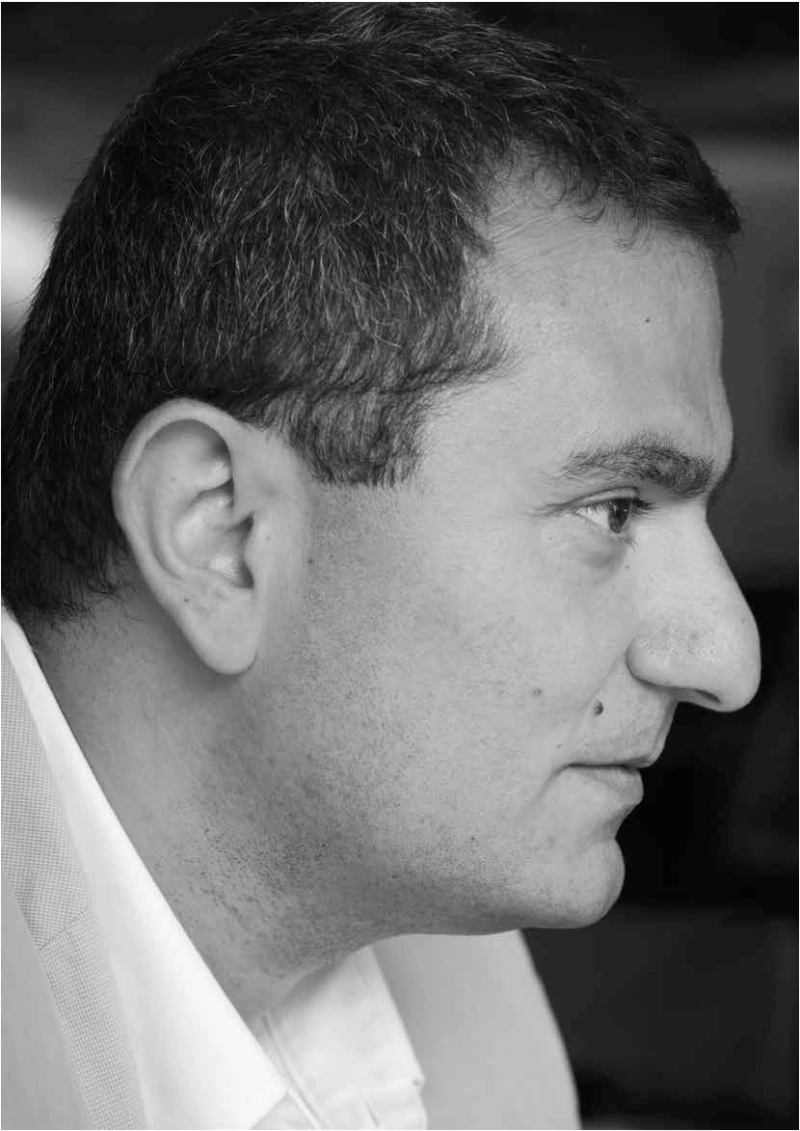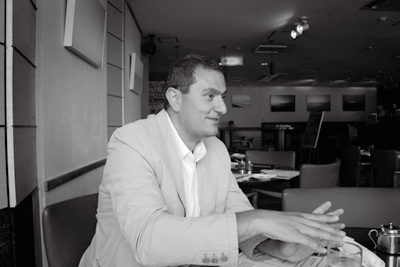Issue:

Japan for postgraduate studies in gas troenterology,” he says. “I was supposed to return home, where I was a practicing physician. But sometimes things happen without giving you any hint of where they might lead.”
Fadi is a familiar face these days in the Arab world. He covers Japan and East Asia for the Arabic language Al Jazeera TV news channel, the Qatar based network that has recently become an alternate source of news not only for the Islamic world but also for many developing countries where people are tired of watching the images brought to their homes by Western TV channels.
His conversion began while he was halfway through his PhD thesis at Tokyo Medical and Dental University, when he was asked to work as a freelance contributor for the Arabic news channel APTN. He accepted, and continued to work as a freelancer while finishing his schooling. When Al Jazeera started its own Tokyo Bureau in 2004, it was looking for an Arab journalist fluent in Japanese; Fadi was their natural choice.
Soon after he began at the network, a group of Japanese was kidnapped in Iraq. As part of his reporting from Tokyo, he interviewed then Japanese foreign minister Nobutaka Machimura, who appealed to the hostage takers for their release. Al Jazeera’s focus on the issue probably had an effect on the eventual release of the kidnapped Japanese, allowing Fadi to taste for the first time the satisfaction of doing something for those in trouble.
That same year, Japan decided to dispatch Self Defense Forces to Iraq. Fadi was again asked to follow the development from Japan and once again became a regular face on Al Jazeera TV news covering the dispatch of Japanese SDF troops to Iraq. These two events committed Fadi firmly to TV journalism; he was drifting further and further from his medical profession.
Fadi has been stationed in Tokyo since, while also covering events in South Korea. When a group of Koreans were kidnapped in Iraq in 2004, Fadi was asked to relocate to Seoul to report the initiatives that had been taken by the South Korean government to ensure their release. It was there that he interviewed then South Korean foreign minister Ban Ki Moon, who has since become Secretary General of the United Nations. During his 10 years with Al Jazeera, Fadi has covered all the important developments in Japan.
His first taste of covering disaster was in 2007, when he went to Niigata prefecture to report on the situation after the Kashiwazaki earthquake. The earthquake temporarily shut down Kashiwazaki Karuiwa nuclear power plant and people from the affected areas were being evacuated to temporary shelters. Covering that disaster helped Fadi get to know Japanese people better. “At the evacuation centers I saw how calmly Japanese people were reacting to the situation,” he says. “There were few signs of panic or despair. They also talked without any hesitation, which as a journalist I’ve found extremely satisfying since we always try to get the opinion of the people who are at the center of any happening. A group of old people were even smiling at me as I filmed them.”
‘DOCTORS TEND TO LOOK BEHIND THE SYMPTOMS. I ALSO TRIED TO LOOK AT THE HIDDEN SIDE OF THE STORY’

The experience of covering that early disaster prepared Fadi for the much larger disaster that hit Japan in March 2011. After calling Al Jazeera to ask to go on the air while the ground was still trembling (and being refused; no one knew how serious it was yet), Fadi was among the first group of foreign reporters to head for the disaster area. At Fukushima Prefecture’s Iwaki city the next day, he found the city hall completely empty and realized that the people had already been evacuated. The people he met were all talking about evacuation centers and hinting about the gravity of an accident at Fukushima Daiichi nuclear power plant.
As a former physician, Fadi realized at once the sense of urgency and tried to approach the power plant. Finding all the roads blocked, he went to a hospital where he was able to interview doctors. One of the doctors told him that he had already sent his family to Tokyo, a strong signal of the seriousness of the situation. Fadi feels that being a doctor helped him in the coverage of the Fukushima disaster. “Doctors tend to look behind the symptoms to find out what was wrong with a patient,” he says. “I also tried to look at the hidden side of the story behind the nuclear accident to get a clearer picture of what really was happening. Talking to doctors and people who had been evacuated was very helpful.”
His knowledge of the Japanese language gave Fadi an edge over other reporters sent from various corners of the world to report on the disaster. At evacuation centers he not only mingled with the evacuated, he also stayed with them, sharing the same food and often sleeping on tatami floors.
Covering Japan for a decade has given Fadi a broad expertise in Japan and in journalism. However, he feels that 10 years has given him a good grasp of the depth of this vocation, and believes that it’s probably time to go back to the world of his training.
“The media in Syria has long been controlled by the government,” he says. “The country is going through many changes and so is the media. Still, if I go back to Syria, I’ll probably practice again as a physician. After all the destruction my country has gone through, people need someone with medical training more than someone walking around with a camera.”
Monzurul Huq represents the largest circulation Bengladeshi national daily, Prothom Alo. He was FCCJ president from 2009 to 2010.

